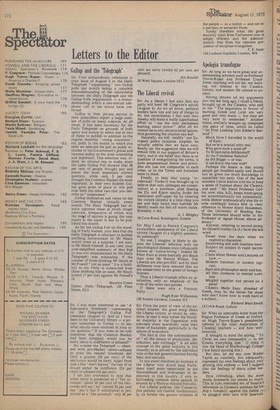Gallup and the 'Telegraph'
Sir: Your extraordinary references in your issue of August 4 to the Daily Telegraph " suppressing " two Gallup polls last month betray a complete misunderstanding of the relationship between the Daily Telegraph and the Gallup Polls organisation — a misunderstanding which a one-minute telephone call to me would have corrected.
Gallup in their private service to their subscribers report a large number of polls on many subjects. At all times, it has been necessary for the Daily Telegraph on grounds of both space and money to select one or two of these to publish in addition to the regular monthly ' voting intentions ', etc, polls. In the month to which you refer we selected the poll on public attitudes to the Government's prices and incomes policy as the most interesting and important. This selection was, indeed, an obvious one to make, since the same Gallup Poll showed that 58 per cent of people thought pay and prices the most important current question, while only 5 per cent thought the Common Market the most important. In their own bulletin Gallup gave pride of place to this poll over both the other two that you describe as "suppressed."
Gallup themselves test views on the Common Market virtually every month. The Daily Telegraph has always reported these at much longer intervals, irrespective of which way the treed of opinion is going: the next report in the paper is due to be published this month.
As for the Gallup Poll on the standing of Party leaders, your idea that the Daily Telegraph is reluctant to publish anything inconvenient to Mr Heath would come as a surprise, I am sure, to Mr Heath himself. In any case, your over-simplified summary of that Poll (it was not commissioned by the Daily Telegraph) was misleading. If the number of those thinking Mr Heath or Mr Powell " not an asset " (i.e. a liability) to his Party is subtracted from those thinking him an asset, Mr Heath scored 17 per cent against Mr Powell's 12.
Maurice Green Editor, Daily Telegraph, 135 Fleet Street, EC4


































 Previous page
Previous page